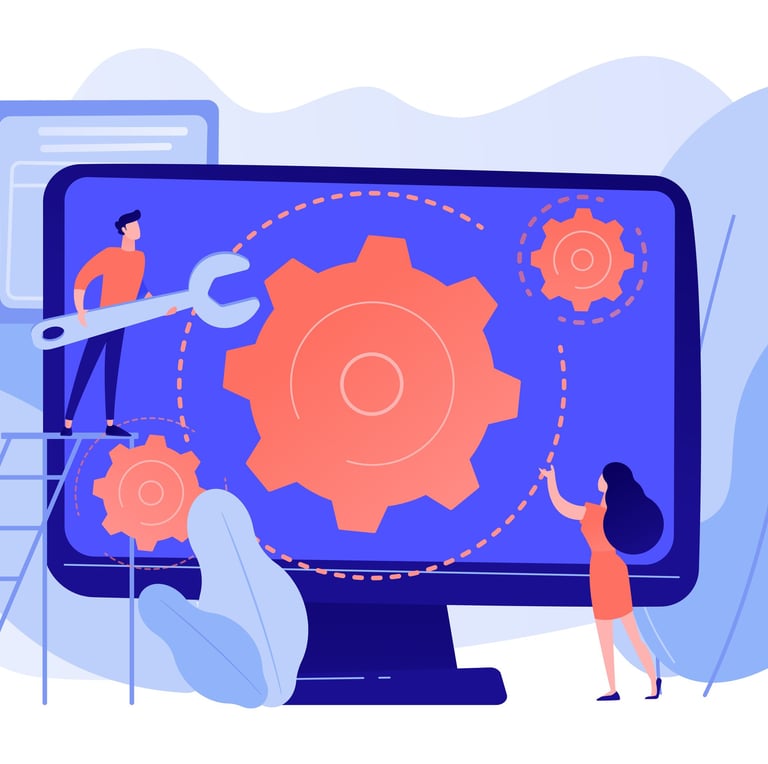Break Silos. Bridge Systems. Automate Seamlessly..
AUTOMAIT connects your tools and automates tasks, so your team can focus on growth.






Why Every Business Needs Cross-System Automation—And How It Can Transform Your Operations
Imagine this:
Your teams are juggling multiple systems—CRM, ERP, HRIS, accounting software, support platforms, and more—while trying to manually sync data, trigger workflows, and keep everyone informed. Sound familiar? You’re not alone. Even with best-of-breed systems, companies waste time on repetitive tasks, risk errors, and miss opportunities because systems don’t naturally talk to each other. Enter cross-system automation, the superhero your business didn’t know it needed:
Data Sync & Integration: One Source of Truth
Keeping data consistent across multiple platforms is tedious. Automation can automatically update records between CRM, ERP, HRIS, and accounting systems, eliminating duplicates and ensuring every team sees the same information. Result? Fewer errors, better reporting, and data you can trust.
Multi-Channel Communication: Reach Everyone Everywhere
Manual notifications across systems are slow and inconsistent. Automation can send alerts, reminders, or updates simultaneously via email, chat apps, or SMS. Result? Teams, partners, and customers receive timely messages without anyone manually forwarding updates.
Task & Workflow Orchestration: Never Miss a Step
Processes often span multiple systems, creating bottlenecks. Automation triggers tasks, approvals, or follow-ups automatically when a condition is met—like creating a purchase order in ERP after a CRM deal closes. Result? Smooth handoffs and processes that flow without friction.
Compliance & Audit Readiness: Reduce Risk
Monitoring compliance across multiple platforms manually is error-prone. Automation ensures approvals, documentation, and audit logs are automatically captured across systems. Result? Reduced risk, easier audits, and peace of mind.
Customer Experience Automation: Unified Journeys
Customers interact with multiple touchpoints—sales, support, and billing. Automation can orchestrate responses, follow-ups, and updates across all systems, ensuring a seamless experience. Result? Personalized, consistent interactions that delight customers.
Advanced Reporting & Analytics: Insights Without Waiting
Data lives in many systems, making reporting slow. Automation consolidates information from multiple platforms into dashboards, triggers AI-driven insights, and delivers actionable reports in real-time. Result? Faster, smarter decision-making.
Vendor & Partner Collaboration: Keep Everyone Aligned
Third-party interactions often involve manual data entry and follow-ups. Automation can sync vendor or partner updates across ERP, CRM, and procurement systems. Result? Fewer errors, faster collaboration, and improved relationships.
Cross-System Alerts & Notifications: Stay Proactive
Manual monitoring of tasks, approvals, or milestones across systems is draining. Automation can notify the right person at the right time when thresholds, deadlines, or conditions are met. Result? Teams respond proactively instead of reactively.
Workflow Optimization & Efficiency: Work Smarter
Cross-system automation can identify bottlenecks, trigger conditional paths, and optimize processes automatically. Result? Increased efficiency, faster cycle times, and teams focused on high-value work rather than manual coordination.
The Bottom Line
Cross-system automation isn’t just a convenience—it’s a strategic advantage. By connecting your CRM, ERP, HRIS, accounting, support, and other platforms, you can eliminate manual data entry, reduce errors, streamline workflows, improve customer experiences, and gain real-time insights.
In a world where businesses operate across multiple tools and platforms, automation isn’t optional—it’s essential. Start with high-impact integrations, expand gradually, and watch your organization transform from siloed and reactive to connected, proactive, and exceptionally efficient.


